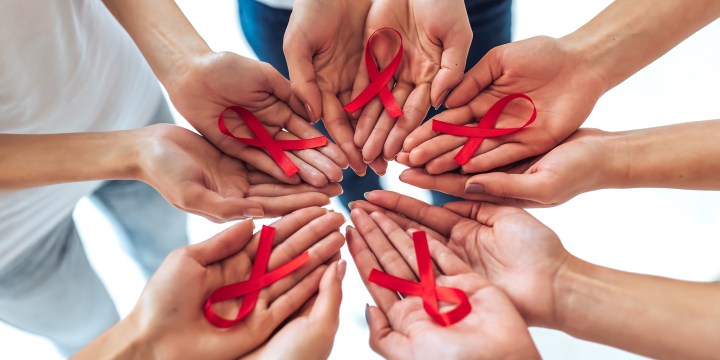WORLD AIDS DAY OP-ED
Forty years on, we must not allow HIV/Aids fatigue to set in

The HIV/Aids pandemic, continues to have a catastrophic impact on South Africa, not only in terms of health but also economically, and in the world of work.
World Aids Day on 1 December is an appropriate opportunity to reflect on how the effects of the disease have been exacerbated by Covid-19 and other pandemics such as gender-based violence (GBV), stigma and abuse, poverty, unemployment and inequality.
About 40 million people around the world are living with HIV and Aids, of which around 26 million are in sub-Saharan Africa. Of those in sub-Saharan Africa, 7.5 million live in South Africa.
About 1.5 million new infections were recorded globally in 2021, of which 860,000 were in sub-Saharan Africa, and 230,000 in South Africa alone. These figures tell us that we need to focus on this issue with renewed energy as a priority, and to raise awareness of this.
While one should not compare pandemics or make them compete against one another, the shifting of all resources and personnel to combat Covid-19 meant that HIV/Aids didn’t receive the same local and global attention, support, or priority, or the same budget allocations.
On World Aids Day, we need to get the message out, strong and clear that, two-and-a-half years down the line with Covid-19, HIV/Aids is still around, and still wreaking havoc with people’s lives. Lest we forget.
One area where it is still very present is in the world of work, where the stigma remains and there is still a reluctance to talk openly about it. Besides the initiatives taken in communities, prevention and care must be extended to the world of work if we are to make inroads into tackling the epidemic.
Tackling HIV/Aids at the coalface of the workplace is something the government also takes seriously. In 2000, the presidency called on institutions of higher education to come to the party in fighting the HIV pandemic and Stellenbosch University (SU) took heed and established a postgraduate programme to take HIV management training and capacity-building to managers and labour leaders of the world of work.
The reasoning for this was that regardless of what was being done in communities, it was also crucial to take this into the workplace by designing relevant policies and awareness, testing and treatment programmes if real progress was to be made in terms of handling the epidemic.
This led to the development of the Postgraduate Diploma in HIV/Aids Management (PGDip), which was first presented in 2001 through the Department of Industrial Psychology. So far, 4,500 students from more than 41 countries in Africa and beyond, have successfully completed the PGDip.
The success of the PGDip led to the establishment of the Africa Centre for HIV/Aids Management in January 2003 as a fully-fledged unit for education, research and community service related to HIV/Aids management in the workplace. In that same year, a Master’s programme (MPhil) was introduced which builds and expands on the HIV-related skills of students who have completed the PGDip. So far, 500 students have successfully completed the MPhil. The centre recently launched a doctoral programme (PhD) in 2020, with its first graduates expected within the next three to four years.
While good progress has been made, a level of fatigue has, without doubt, set in regarding issues of HIV/Aids given the long period HIV has been with us. This is — among other reasons — also due to good treatments which mean that HIV is no longer a death sentence as it is now better managed which results in lapses in behaviour, and possible reinfections.
Visit Daily Maverick’s home page for more news, analysis and investigations
It is imperative for managers in the world of work to ensure that there are effective, relevant and updated policies and programmes in place to support their staff directly affected by HIV/Aids.
Human capital is, after all, a vital part of any organisation. If there are no effective and up-to-date policies and practices in place to look after the welfare of organisations’ human capital, it will have an adverse impact on productivity and staff morale. The policies and programmes should be aligned with international frameworks on HIV/Aids, such as the UNAids 95-95-95 targets (to diagnose 95% of all HIV-positive individuals, provide ART for 95% of those diagnosed, and ensure viral suppression for 95% of those treated by 2030) and the United Nations Sustainable Development Goals (SDGs).
These policies and programmes must be regularly audited and updated.
If organisations’ policies and programmes don’t align, they fall behind in terms of international best practice and are also unable to draw on the support offered by relevant international entities to effectively manage HIV/Aids in the world of work.
A recent study on the “effectiveness and relevance of HIV and TB workplace legislation, policies and programmes in the context of SDGs and UNAids fast-track goals in South Africa” undertaken by the Africa Centre for HIV/Aids Management at SU in partnership with the ILO and UNAids, assessed the state of play with regards to HIV and TB workplace policies and programmes across a number of sectors.
The sectors included were construction, agriculture, mining, transport and automotive, retail, banking, tourism, and education to establish whether they have policies and programmes in place to deal with HIV/Aids, and the extent to which they are aligned with international programmes.
While some sectors are doing well, several sectors do not have adequate, relevant, updated and active HIV/Aids policies and programmes. Some set up HIV and TB policies and programmes 30 years ago, but have not revisited or audited them for a long while.
The mining, automotive, insurance and banking sectors are doing comparatively well in terms of having strong, supportive and updated HIV/Aids policies and programmes for employees. But other sectors, such as agriculture, retail and construction, are lagging behind and not investing to the same extent in such policies and programmes.
A number of initiatives are underway to address the current status. Organisational role players like NGOs are stepping up with advocacy and lobbying the government for appropriate policies that are cognisant of newly emerging issues to be more friendly around treatment, policy alignment, gender, equity and access.
The Treatment Action Campaign (TAC), the South African Business Coalition on Health and Aids (Sabcoha), Business Unity South Africa (Busa) and the SA National Aids Council (Sanac) also push for better policies and related issues, including stigma, to be removed.
The Minerals Council of South Africa’s Masoyise Health Programme also looks at the issues related to HIV/Aids that face workers in their economic sector. There are a number of such initiatives, but we need to step up the training, lobbying and advocacy around the inequalities and stigma that still exist.
Issues relating to HIV and Aids are rife in the world of work and the stigma is still very much with us.
Four decades into the HIV/Aids pandemic, many workplace sectors have dropped the ball in terms of their management training, policy and programme audits and updates of the pandemic. They need to refocus on looking after their human capital because, after all, people are the biggest assets in organisations.
Community leaders and managers in the world of work across all sectors must not allow this fatigue to set in. Workplaces need to refocus themselves to manage the ever-present HIV pandemic.
If we are to remain on course to achieve the UNAids 95-95-95 and UN SDGs by 2030, we cannot afford to relax our efforts, especially after the delays caused by Covid-19. DM
Dr Munya Saruchera is Senior Lecturer and Interim Director of the Africa Centre for HIV/Aids Management and an Associate of the School for Climate Studies at Stellenbosch University. He is an Ashoka Fellow.




















 Become an Insider
Become an Insider
Comments - Please login in order to comment.